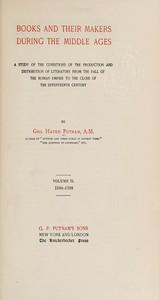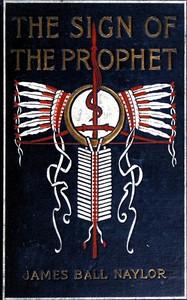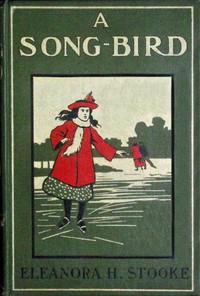|
|
Read this ebook for free! No credit card needed, absolutely nothing to pay.Words: 191975 in 64 pages
This is an ebook sharing website. You can read the uploaded ebooks for free here. No credit cards needed, nothing to pay. If you want to own a digital copy of the ebook, or want to read offline with your favorite ebook-reader, then you can choose to buy and download the ebook.

: Books and their makers during the Middle Ages Volume II by Putnam George Haven -@FreeBooksMon 08 Apr, 2024 PREFACE iii INDEX 511 THE EARLIER PRINTED BOOKS. THE EARLIER PRINTED BOOKS. THE EARLY PRINTER-PUBLISHERS OF FRANCE. It was in 1462 that the first examples of printed books were seen in Paris. In that year, Fust brought from Mayence a supply of his folio Bible, copies of which he was able to sell for fifty crowns. The usual price for manuscripts of this compass had been from four to five hundred crowns. It seems probable that there was little or no foundation for the stories that were, later, told of Fust's being harshly treated as a magician, on the ground that the volumes he was offering for sale could not have been produced by human hands, or without the aid of the powers of evil. There was a manifest improbability in the idea that Satan would interest himself in securing a wider circulation for the holy Scriptures, unless possibly he had taken occasion to inject into falsified texts some heretical or pernicious doctrine. It is probable also that, by the time of Fust's arrival, more or less information must already have reached Paris about the new art, and that, while it was still regarded as mysterious and wonderful, it was recognised as a human invention that had in other cities already been applied to practical uses. In this edict, Louis speaks with great appreciation and admiration of the printing art, "the discovery of which appears to be rather divine than human." He congratulates his kingdom that in the development of this art "France takes precedence of all other realms." A year later, the King put on record his opinion that dramatic productions and representations should be left free from any restrictions. In 1512, the King writes to the University requesting the Faculty to examine a book which the Council of Pisa had condemned as heretical. In place, however, of demanding or suggesting that measures of severity should be taken against the writer of the book, the King proposed that the professors should have the book gone over chapter by chapter and should put into form a refutation of any of its conclusions which seemed to them to be contrary to the truth. The second Press established in Paris was that of Caesaris and Stoll, who began work for themselves in 1473. They were both students of the University but they found it desirable to carry on their business outside of the University limits. The demand in Paris, both within and without the University, for printed books, increased very rapidly, and before the close of the century the trade in books far exceeded that of any city in Europe. For a number of years, however, a very large proportion of this demand was supplied from the presses of Mayence, Strasburg, Venice, Milan, Cologne, and Bruges. After Paris, Lyons was the city of France in which the art of printing secured the earliest introduction and the most rapid development. The printer-publishers of Lyons showed themselves "enterprising" in more ways than one. They were free from the immediate supervision and control of the authorities of the University of Paris, and, as the history of the Paris Press shows, the difficulties placed in the way of publishing undertakings by the bigoted and ignorant censorship of the theologians, must have more than offset the advantages usually to be secured in the production of scholarly publications, through the facilities of the University collections and the editorial service rendered by the University members. In the matter of political censorship, Lyons was, of course, in form at least, subject to the same regulations that controlled the presses of Paris. It was, however, evidently much more difficult to exercise any strict and continuous supervision over the printers of the provinces than over those of the capital, and in politics, therefore, as well as in theology, the publishers of Lyons enjoyed a greater freedom of action. "The freedom of action," of which their Paris competitors made the sharpest criticism and the most reiterated complaints, was shown in the practice of the Lyons competitors, of promptly appropriating for their own profit and reproducing, with more or less closeness of imitation, such of the Paris publications as they found available for the markets within their reach. The "privileges" issued by the Crown and the special authorisations given by the University appear to have availed but little to repress this appropriating enterprise on the part of the publishers of Lyons. The enterprise of these early Lyons publishers was manifested also in another and more legitimate direction. They gave attention to the production of books in light literature, such as popular romances, legends, folk-songs, etc., printed, of course, in the vernacular, at a time when the printers of Paris and, for that matter, the printers of nearly all the other book-manufacturing cities of Europe were devoting their presses exclusively to theology and to the classics. Other cities the printers of which interested themselves in light literature were Bruges and London, the records of which are referred to in another chapter. In 1507, a Greek Press was established in Paris by Giles Gourmont. The Press was under the general supervision of the University, but the immediate responsibility for the undertaking rested with Francis Tissard. Tissard was a French scholar, who, having studied in Padua and Bologna, had become imbued with an earnest zeal for the development of classical scholarship in France. He had secured instruction in Greek from a certain Demetrius Spartiata, and it was his special object to establish in the University of Paris the study of Greek language and literature, and to bring the cost of Greek books within the means of the poorer instructors and students. The few scholars in France who had heretofore been interested in Greek books had been obliged to incur the expense of securing these from Milan or from Venice. Free books android app tbrJar TBR JAR Read Free books online gutenberg More posts by @FreeBooks
|
Terms of Use Stock Market News! © gutenberg.org.in2025 All Rights reserved.






